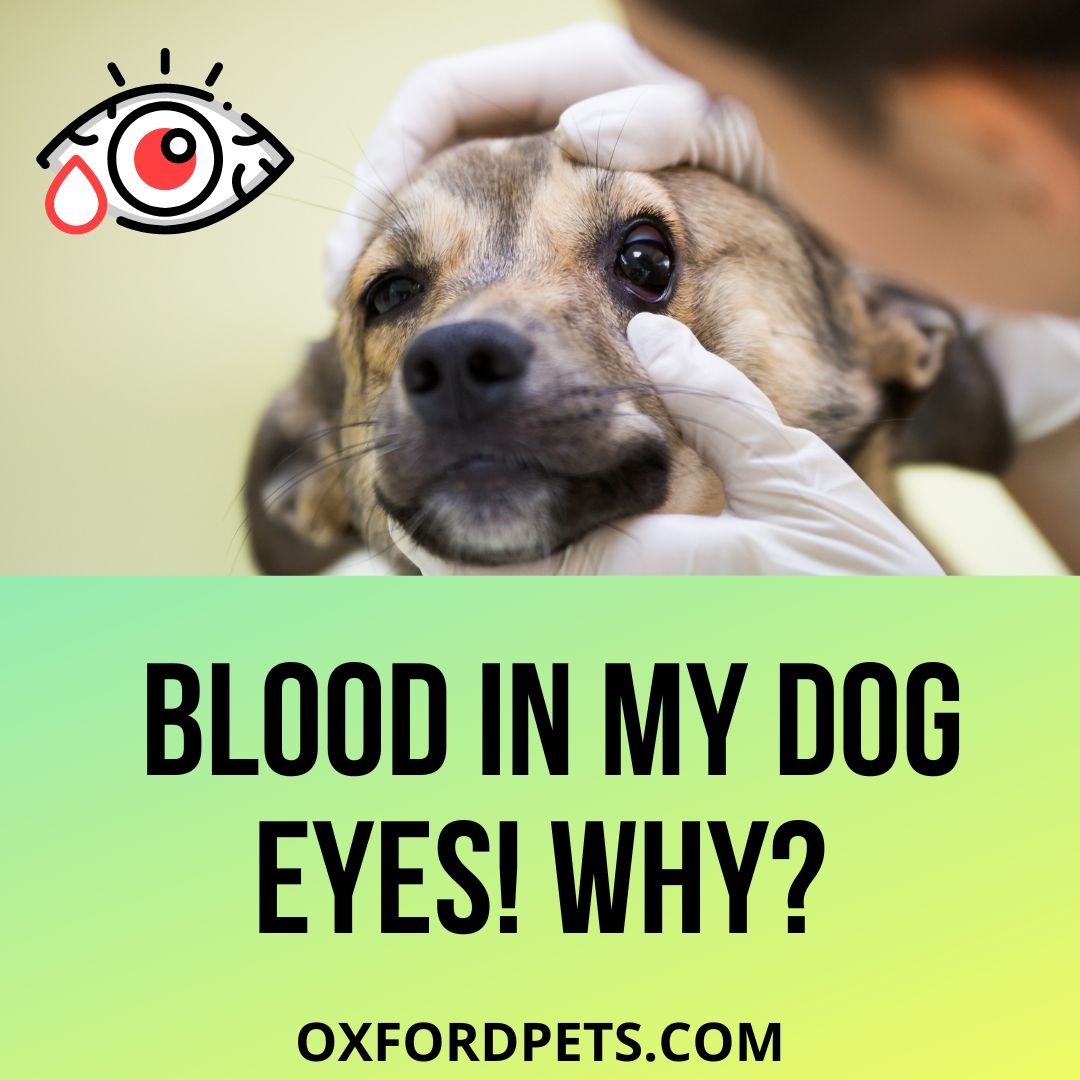Have you ever seen blood in your dog’s eyes? Isn’t it horrifying? Eyes are important. That is why doctors recommend that we check our eyes twice per year. Any issue in the eyes can result in permanent blindness. Same way, your canine’s eyes are very important as well. Hyphema and Retinal Haemorrhage are the two most common disorders that can occur.
Contents
Hyphema Vs. Retinal Hemorrhage
It is the presence of blood in the front chamber of your canine’s eye. The blood quantity varies from case to case. Sometimes, Hyphemma can appear as red-pinkish-coloured fluid in the eyes. Serious hyphema happens when the whole chamber is filled with blood and the dog becomes blind.
Hyphema originates from bleeding in the iris blood vessels. However, it can also originate from tissues behind the iris, retinal blood vessels, or choroidal blood vessels.

Symptoms of Hyphema in dogs
The most common sign of Hyphema is bleeding from the eye. However, there are other signs as well that can indicate Hyphema in dogs.
- The dog is in pain
- Squinting of eye
- Unclotted blood in the eye
- Rubbing the eye excessively
- Reduced appetite
- blood shots eyes after bath
Causes of hyphema in dogs
Repository.upenn.edu says that Hyphema has both systemic and localised causes.
Systemic causes:
There are two systemic causes of hyphema in dogs-
- Coagulation disorders: Ehrlichiosis, Von Willebrand disease, Coagulopathies, Thrombocytopenia, Anticoagulant poisoning, etc.
- Hypertension: It is an increase in blood pressure that is the result of various issues like hormonal imbalance, stress, heart disease, etc.
Localised causes:
There are different localised causes of hyphema in dogs.
- Uveitis: It is an inflammation that affects the vascular tunic of your canine’s eye.
- Trauma: This is the most common cause for hyphema. Trauma because of collision, fall, blow, etc can lead to blood in the eyes.
- Ocular neoplasms: It can be fatal and hyphema is one of its symptoms. Moreover, it also leads to an increase in intraocular pressure.
- Congenital eye abnormalities: This one is the genetic inheritance that can be related to specific breeds.
- Retinal detachment: This is more common in aged dogs. Also, it has different causes that can be acquired or genetic.
- Glaucoma: It is caused by retinal or optic nerve damage.
What Are Some Treatments For Hyphema?
Hyphema treatment includes oral and topical anti-inflammatory medicines. Canines can
Treatment of hyphema includes topical and oral anti-inflammatory medications. Dogs may be started on glaucoma drops if they are at risk of developing secondary glaucoma. If a tumour or cancer is suspected, oral anti-inflammatory medications may not be started initially since these therapies can interfere with cancer diagnosis and treatment.
What is Retinal Haemorrhage?
In Retinal Haemorrhage, bleeding occurs in the area of the retina. Basically, it is the part of the eye that lies in the backside of the eye and takes care of the light that comes to the eye. It acts as a film in a camera. Bleeding in the retina can originate from the choroid or then blood vessels of the retina. This bleeding can come from veins, capillaries, or arteries.
Retinal Haemorrhage in canines can arise from pathologic processes anywhere in the body. Hence, in many canines, the presence of retinal haemorrhage is usually a sign of severe health issues. These health issues can be a threat to the health of the canine than the actual haemorrhage.
Symptoms of Retinal Haemorrhage in dogs
Retinal haemorrhage can have a variety of symptoms. Some of them include:
- Dilating pupils
- Lost vision
- White pupils
- Discharge from eyes
- Bleeding from eyes
Causes of Retinal Haemorrhage in dogs
The most common cause of retinal haemorrhage in dogs are infections, genetic predisposition, and physical trauma. Additionally, it is considered a symptom of the below-mentioned diseases.
- Cushing’s disease
- Blastomycosis
- Liver disease
- Choking injuries
- Haemophilia
- Vitamin K deficiency
- Leukaemia
- High blood pressure
- Hyperviscosity syndrome
- Tumours
- Septicemia
- Surgery around eye
Treatments for Retinal Haemorrhage in dogs
If you find your canine developing retinal haemorrhage, your vet will do some physical tests and see your canine’s medical history. Moreover, he may also need urine, electrolyte, or blood tests.
Also, the vet may examine your canine’s retina to see any abnormal signs. In many cases, the vet can also make use of ultrasound and eye fluid analysis to confirm the diagnosis.
Talking about the treatment will depend on the current condition and situation. In many cases, only medicines are enough. You just have to follow the medication precisely. In severe cases, vets recommend surgery on the retina.
When your canine recovers at home, you may need to make a few environmental changes to help your canine with loss of vision. In addition, it is very important to take regular appointments with the vet to keep an eye on the health and recovery of your canine’s eyesight.
Final words
Hyphema and Retinal Haemorrhage in dogs are something that can get very severe if not taken care of on time. Therefore, it is very important for you to keep an eye on what your canine is doing and what health concerns he is facing. Seeing blood in your dog’s eyes is disturbing. Therefore, it is better to rush to your vet when you encounter such a situation.
I hope you enjoyed the article. I will be back soon with more interesting and informative pieces of writing. Till then, stay connected. Thank you.
Frequently asked questions
What is the difference between hyphema and subconjunctival haemorrhage?
Hyphema is the bleeding in the eye that makes blood pool between the layers in your canine’s eyes. A subconjunctival haemorrhage is a broken blood vessel on the eye. It looks like a red spot in the eye. It is more common and less serious than hyphema. According to files.brief.vet, in 81% of cases, subconjunctival haemorrhage in dogs is caused due to a traumatic event.
Is hyphema in dogs fatal?
Hyphema can be caused by systemic deficiencies and ocular deficiencies. And some of them can be fatal for your canine. Hence, hyphema diagnosis and treatment are very important.
What does a bloody eye indicate?
Bloody eyes can indicate subconjunctival haemorrhage. It is the broken blood vessel in the eye. It looks severe, however, it is harmless in most cases. It happens when a blood vessel breaks under the surface of the eye. In simple words, it is like having a small injury on the skin.
Is a bloody eye serious?
In reality, most bloody eyes are harmless and can happen because of a small broken blood vessel of the eye. The actual cause of bleeding is not always known. For instance, eye bleeding in the iris and pupil is known as hyphema. It is rare but can become severe if not diagnosed on time.
When should I be concerned about a bloody eye?
If you see blood in your canine’s eye for more than 2 to 3 weeks, it is best to call the vet immediately. Moreover, if your dog has problems in the eyes, has more than 1 subconjunctival haemorrhage, or if the blood is anywhere in the coloured area of your canine’s eye, then your vet is the best one to provide the best treatment.
Can bleeding behind the eye be cured?
If there is less blood in the vitreous and you know the source of the bleeding then you can take the help of the vet to treat it. The treatment will repair the abnormality in the blood vessels. After the treatment, you have to give time for the blood vessels to heal. After a few weeks, the bleeding will be cured.
